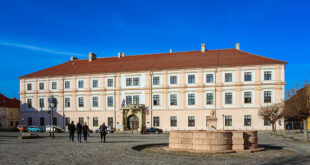Nestled at the crossroads of Central and Southeast Europe, Croatia stands out for its breathtaking landscapes and a cultural and academic legacy that spans centuries. From the picturesque coastline of the Adriatic Sea to the medieval charm of its historic cities, this small yet culturally rich country has so much for international students to discover during their study journey. Moreover, one of the best way to ensure a smooth journey in Croatia is to learn about its culture, language and traditions. That’s what this guide is about, so get ready for the adventure!
Table of Contents
Geography and Climate
Croatia, or officially the Republic of Croatia, is a small country that ranks 19th in the EU in size. Shaped like a horseshoe, it’s a country that stands out for its diverse landscape, which consists of plains, lakes, rivers, mountains, and over a thousand islands along the Adriatic coast. Another key fact is that of Croatia, about 10% of the territory is made of well-preserved natural environment within 12 nature parks, 8 natural parks and 2 strict nature reserves.
Moreover, situated in Southeast Europe, Croatia shares borders with Slovenia, Hungary, Serbia, Bosnia and Herzegovina, and Montenegro. It has declared independence from Yugoslavia in 1991, making it a quite young country politically. However, Croatia’s history has influences from as early as the Byzantine, Roman, and Illyrian kingdoms, as well as from the Austro-Hungarian and Ottoman periods.
As for the climate, Croatia experiences diverse climates due to its varied geography and proximity to the Adriatic Sea. This includes continental plains, with hot summers and moderately cold winters; mountainous regions, with lower temperatures and higher precipitation. At last, Croatia’s coastline has a Mediterranean warm and temperate climate.
Population and Language in Croatia
As much as its cultural influences, Croatia boasts also a language diversity. The official language in the country is the Croatian. However, about 80% of the population is multilingual, among whom, more than 80% are English-speakers.
And, much to the delight of international students, almost all high-profile universities in the country provide 100% English degree programs. Moreover, almost half of the multilingual group in Croatia speak German, and almost 25% of them speak Italian.
Alongside fostering internationalization, Croatia also offers several opportunities for foreign students to study the Croatian language. And one notable fact about Croatian is that it uses the Latin alphabet, with the addition of a few diacritic marks. Words are also pronounced as they’re spelled, making it relatively easy for foreigners to learn and pronounce.
And we won’t emphasize enough on the importance of learning the language of the country you’re studying abroad. Take therefore advantage of all possibilities in Croatia to study the language, if only to improve your day-to-day interactions with the locals. You can find such courses at major Croatian universities.
At the University of Zagreb, for example, you have Croaticum, the oldest and largest institution dedicated to the teaching and research of Croatian as a foreign language. It offers therefore several programs to cater different students’ level and needs, from summer schools to individual tutoring.
What is the Main Culture of Croatia?
Croatia’s unique geography and history mix have shaped the country’s culture with a blend of Slavic and Mediterranean influences. More specifically, the Italian culture has left a lasting mark on the language and architecture in the coastal regions.
One main aspects of this Mediterranean side is the laid-back lifestyle and the importance of family and community. The daily life of Croatians are marked by close-knit communities and family-owned businesses. Family gatherings and celebrations are also common.
Visitors, including international students in Croatia, can experience this rich culture and historical influence through various aspects of daily life in the country. This includes architecture, art, food, literature and music.
Moreover, the other big influence on the Croatian culture is the Roman Catholic religion, practiced by around 80% of the population. And this goes from church buildings to religious art and the prevalence of religious holiday celebrations alongside national holidays and events.
Croatia’s Culture And Traditions: Main Holidays and Celebrations
Several festivals and holiday celebrations throughout the year display the importance of traditions for the Croatians. Here are some of the main holidays and events in Croatia:
- Dan državnosti – Statehood Day on May 30 which commemorates Croatia’s declaration of independence from Yugoslavia in 1991. This is a public holiday and a day off from work.
- Dan neovisnosti – Independence Day on June 25, which celebrates the decision of the Croatian parliament to cut off ties with Yugoslavia. This is a Memorial Day and not a public holiday.
- Praznik rada – Labour Day on May 1st, this holiday honors workers and the labor movement. This is a national holiday which many Croats celebrate through spending the day with family or friends.
- Dan svih svetih – All Saints’ Day on November 1st. This is a public holiday and therefore a day off for the general population, with schools and most businesses closed.
Other public national holidays in Croatia include Epiphany on January 6, Easter and Easter Monday, Christmas on December 25 or Victory and Homeland Thanksgiving Day on August 5.
Some of the main festivals in Croatia are:
- Dubrovnik Summer Festival, during the summer months, featuring a variety of music, theater, dance, and other performances.
- International Folklore Festival in Zagreb in July. This event showcases traditional music, dance, and costumes from Croatia and around the world.
- Split Summer Festival, taking place in the city of Split during the summer. This festival features a diverse program of cultural events including theater, music, dance, and film.
Food and Dining Etiquette
The emphasis on family, friends and food in the culture in Croatia reflects in the way they treat their guests. It’s common practice, when invited for a meal by a Croatian family, that the host ensures you leave their home completely full. And they’re quite generous when it comes to feed their guests.
However, as a guest, saying no can be considered rude, so to politely decline after several helpings, you can say ‘Hvala, ne mogu više’ (Thank you, but I am full). Also, since it’s certain that you’ll get several servings, start with a small portion the first time to have space to accept another helping.
Moreover, as the majority of Croatians are Catholic, it’s customary in many families to say a prayer before a meal. So, always wait for your host’s signal to begin before digging into your plate. And while eating, keep your hands above the table. It’s considered to be rude to place your hands under the table during meal time.
Additionally, lunch is the main meal of the day in Croatia, and it consists of multiple courses. Many Croatians, therefore, take their lunch at home and come back to work or at school after eating.
Lastly, when eating at a restaurant or a café, tipping 5-10% is standard practice. And if your Croatian friend insists on paying, let them pay, but don’t take advantage either of their generosity by offering to pay the bill some other time.
Social Customs and Etiquette in Croatia
Croatia has a very strong coffee culture, with many cafés where people socialize over a cup of coffee. There are not much coffee to go places.
Around the workplace and in public, it’s a sign of respect to greet people as you pass them by. And when you meet people for the first time, greetings are formal: a handshake, eye contact and the appropriate formula for the time of day: “Dobro jutro” (good morning) or “Dobro dan” (good day) or “Dobro veèer” (good evening).
Moreover, it’s advisable to address people only using their titles and last names. First names are reserved for friends and family members. Therefore, avoid calling people using their first names unless you’re invited to.
Additionally, Croatians tend to be extremely punctual and expect others to extend the same courtesy. And this is as important in your social circle and as well as your professional setting.
Culture Taboos in Croatia
Some gestures and discussion topics are to avoid when interacting with locals in Croatia. This includes pointing your finger index toward a person or an object. It’s considered rude as it means you belittle the person. When pointing towards a person or something, the polite way is to use the whole hand or nod with your head.
Sensitive topics include any comparison to anything Serbian or reference to Croatia as Yugoslavia. It’s also taboo to discuss other ethnicities of Yugoslavia, if not anything related to Yugoslavia, in casual conversations. Croatians tend to have nationalistic views, and these topics are therefore to avoid if you mean to build lasting relationships with them.
Things To Do in Croatia for Foreign Students
Despite being a relatively small country, Croatia hosts an impressive number of UNESCO sites. More precisely, there are 7 of them, including Diocletian’s Palace in Split, Dubrovnik’s old town or the Stari Grad plain.
Another place worth visiting in Croatia is the city of Pula in the Istria region. This city is believed to be one of the oldest city in Europe to have been continuously inhabited, with a history dating back to over 3,000 years.
Moreover, the country’s coastline, along the Adriatic Sea, offers opportunities for water sports, boat tours and paddleboarding excursions among other activities. And national parks such as Plitvice Lakes and Krka are perfect for hiking and cycling.
And of course, since Croatia is part of the EU, it makes it easier for international students to visit neighboring countries such as Hungary, Slovenia or Italy, during holidays.
More articles on studying abroad in Croatia:
Top universities in Croatia for international students
The cost of living and student accommodation in Croatia




 Aljawaz Your guide to study abroad
Aljawaz Your guide to study abroad






